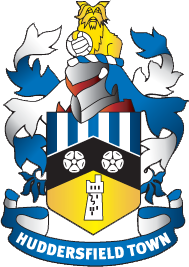
Huddersfield Town Football Club
Huddersfield Town Football Club was only formed in 1908 largely through the financial support of a Mr. Hilton Crowther. The rise of the club formed was remarkable.
Having begun life in the North-Eastern League the club was elected into Division Two of the Football League in 1910. Huddersfield achieved nothing of note before World War 1 but immediately after this conflict the club embarked on an astonishing run of success.
After a slow start to the 1919-20 season the Terriers romped to promotion, although they had to settle for the runners up spot because of the superb form of Tottenham Hotspur. The club also won through to the FA Cup final. They had recorded fine victories over Newcastle United and Liverpool along the way but lost by the only goal to Aston Villa in the final.
Two years later Huddersfield reached the cup final again and this time won by the only goal, Billy Smith converting a dubious penalty to see off Preston North End.
This triumph helped finally put the football club on the map in an area that was a traditional rugby league stronghold. Only a few years earlier the clubs directors had recommended moving the club to Leeds before deciding to carry on in Huddersfield.
Ironically this great period of success was triggered by events in Leeds. When Leeds City were expelled from the league in 1919 their manager, Herbert Chapman, was suspended for one year. When this suspension was served, in September 1920, Chapman joined the Leeds Road club as manager.
The 1922 FA Cup was his first success in charge of the Terriers. There was more to come.
In 1924 Huddersfield won the league championship for the first time, edging out Cardiff City on goal average. In 1925 they retained their title after setting a new record for goals conceded, a miserly 28.
This run of success saw Chapman snared by the southern giants Arsenal but even without him Huddersfield were able to complete a historic hat trick of championships in 1926.
There is no doubt that the Huddersfield side that set this record was based on function rather than flair and most of its key men were defensive in nature. Clem Stephenson, Sam Wadsworth and Sam Barkas were all dependable servants although the Terriers did have the outstanding Alex Jackson, one of the Scottish Wembley Wizards, in their forward line.
Huddersfield managed to finish 2nd in each of the next two seasons before quickly fading as a force.
In 1928 the club reached another FA Cup final, losing 3-1 to Blackburn Rovers, and in 1930 there was another Wembley defeat, this time 2-0 against Chapman’s new club Arsenal.
Huddersfield made their last appearance in the FA Cup final in 1938 but suffered defeat to Preston who gained revenge for 1922 by winning 1-0 with a disputed penalty of their own, right at the end of extra time.
After the Second World War Huddersfield found it increasingly difficult to maintain their position in the first division.
They were relegated in 1952 and although they bounced straight back as Division Two runners up the following year they were relegated again in 1956.
This time it would be fourteen years before Huddersfield earned promotion again and, despite going up as champions, they could only manage a two year stay in Division One. Since relegation in 1972 the Terriers have never been back to the top flight of English football.
Huddersfield dropped into Division Three for the first time a year later in 1973 and in 1975 slumped into the fourth division.
For over twenty years Huddersfield spent their time shifting between the middle two divisions of the Football League before a sharp decline saw them relegated twice in three seasons to drop down to the fourth tier of English football in 2003.
Happily the club immediately won promotion with a penalty shoot out play off victory over Mansfield Town in 2004 and are currently in League One.
Huddersfield’s best effort in the League Cup came in 1968 when they knocked out Wolves, Norwich, West Ham and Fulham before losing 6-3 on aggregate to Arsenal in the semi finals.
In 1994 they also reached the final of the Autoglass Trophy only to lose in one of the most embarrassing penalty shoot outs ever to Swansea City. Huddersfield could not convert any of their penalties and two successes by Swansea were enough to give them the trophy.
